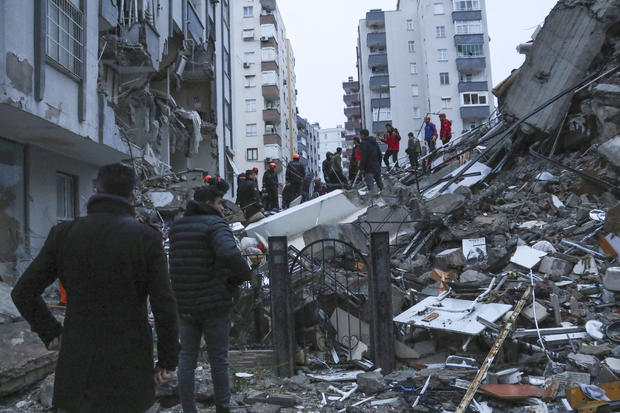Major 7.8 earthquake rocks Turkey and Syria, killing hundreds
IHA agency via AP
A powerful 7.8 magnitude earthquake hit southern Turkey and northern Syria early Monday, toppling buildings and triggering a frantic search for survivors in the rubble in cities and towns across the region. At least 360 were killed — 237 in government-held areas of Syria alone — and the toll continued to rise. Hundreds upon hundreds were injured, authorities in both nations said.
On both sides of the border, residents jolted out of sleep by the pre-dawn quake rushed outside on a cold, rainy and snowy winter night. Buildings were flattened and strong aftershocks continued.
Rescue workers and residents raced to search for survivors under the rubble of their homes in multiple cities, working through tangles of metal and chunks of concrete.
Turkey’s Disaster and Emergency Management agency said at least 76 people in seven Turkish provinces were killed and 440 injured. In addition to the 237 dead in government-held areas of Syria, more than 630 were injured, according to Syrian state media. At least 47 people were reported killed in rebel-held areas.
In the Turkish city of Adana, one resident said three buildings near his home collapsed. “I don’t have the strength anymore,” one survivor could be heard calling out from beneath the rubble as rescue workers tried to reach him, said the resident, journalism student Muhammet Fatih Yavus. Further east in Diyarbakir, cranes and rescue teams rushed people on stretchers out of a mountain of pancaked concrete floors that was once an apartment building.
On the Syrian side of the border, the quake smashed opposition-held regions that are packed with some 4 million people displaced from other parts of Syria by the country’s long civil war. Many of them live in decrepit conditions with little health care, with Russian-backed Syrian forces surrounding the area and sometimes carrying out airstrikes. Rescue workers said hospitals in the area were packed.
“We fear that the deaths are in the hundreds,” Muheeb Qaddour, a doctor, said by phone from the town of Atmeh, referring to the entire rebel-held area. Raed Salah, the head of the White Helmets, the emergency organization in opposition areas, said whole neighborhoods were collapsed in some areas.
The quake, felt as far away as Cairo, was centered about 60 miles from the Syrian border, just north of the city of Gaziantep, a major Turkish provincial capital of more than 2 million people. The region has been shaped by more than a decade of war in Syria. Millions of Syrian refugees live in Turkey. The swath of Syria affected by the quake is divided between government-held and opposition-held areas.
The U.S. Geological Survey said the quake was 11 miles deep.
At least 20 aftershocks followed, some hours later during daylight, the strongest measuring 6.6, Turkish authorities said.
U.S. National Security Adviser Jake Sullivan issued a statement saying, “The United States is profoundly concerned by the reports of today’s destructive earthquake in Turkiye and Syria. We stand ready to provide any and all needed assistance. President Biden has directed USAID and other federal government partners to assess U.S. response options to help those most affected. We will continue to closely monitor the situation in coordination with the Government of Turkiye.”
Many other nations offered to help as well. Among them — war-torn Ukraine, whose president, Volodomyr Zelenskyy, said Ukraine is “close to the friendly Turkish people” and ready to provide assistance, according to the Reuters news service.
Turkish President Recep Tayyip Erdogan said on Twitter that “search and rescue teams were immediately dispatched” to the areas hit by the quake.
“We hope that we will get through this disaster together as soon as possible and with the least damage,” he wrote.
Turkey’s Disaster and Emergency Management agency said at least 76 people in seven Turkish provinces were killed. The agency said 440 people were injured.
Buildings were reported collapsed in a swath from Syria’s cities of Aleppo and Hama to Turkey’s Diyarbakir, more than 200 miles to the northeast.
In Turkey, people trying to leave the quake-stricken regions caused traffic jams, hampering efforts of emergency teams trying to reach the affected areas. Authorities urged residents not to take to the roads. Mosques around the region were being opened up as a shelter for people unable to return to damaged homes amid temperatures that hovered around freezing.
In Diyarbakir, rescue teams called for silence as they tried to listen for survivors under the wreckage of an 11-story building. Rescue workers pulled out one man, carrying him on a stretcher through a dense crowd of hundreds of people anxiously watching the rescue efforts. A gray-haired woman wailed before being escorted away by a man, while a rescue worker wearing a white helmet tried to calm a crying girl who was also being cuddled by two friends.
In northwest Syria, the opposition’s Syrian Civil Defense described the situation in the rebel-held region as “disastrous” adding that entire buildings have collapsed and people are trapped under the rubble. The civil defense urged people to evacuate buildings to gather in open areas. Emergency rooms were full of injured, said Amjad Rass, president of the Syrian American Medical Society.
In Damascus, buildings shook and many people went down to the streets in fear.
The quake jolted residents in Lebanon from beds, shaking buildings for about 40 seconds. Many residents of Beirut left their homes and took to the streets or drove in their cars away from buildings.
The earthquake came as the Middle East is experiencing a snowstorm that’s expected to continue until Thursday.
Turkey sits on top of major fault lines and is frequently shaken by earthquakes.
Some 18,000 were killed in powerful earthquakes that hit northwest Turkey in 1999.
For all the latest World News Click Here
For the latest news and updates, follow us on Google News.


